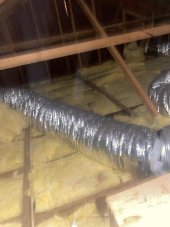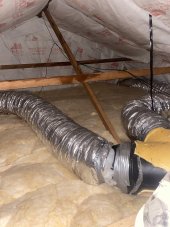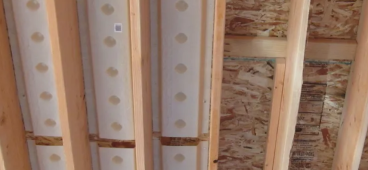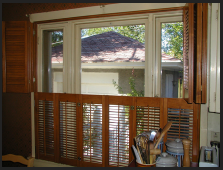...you can't just turn the spigot off when the infrastructure to make it happen just isn't there.
It's not a
sudden spigot turnoff, our
national strategy is a 30-year plan and we've known about climate change for decades.
A lot of the arguments you hear are from people resisting the change, trying to prevent that infrastructure. They know anything they can do to delay or destroy the existing infrastructure so painfully built-up (e.g.,
Florida HB 741) slows progress. But that progress creates new businesses and brings new jobs at the cost of toppling century-old monopolies. Without the dire need for oil, countries that don't have it can't be held hostage by countries that do.
People don't like things shoved down their throat.
I see it more like WWII. Americans didn't want to get involved until the sneak attack on Pearl Harbor. Many thought it just wasn't our fight.
A lot of folks feel the same way about climate change. It's either not their fight, they're willing to let others do it, or they're actively resisting it. So it might feel like it's shoved down their throat now. But it's a problem we made over the last century and then ignored the last 30 years as we were more afraid of other things. It feels that way because like Pearl Harbor, a lot of us (me included) are just waking up to the cold harsh reality of climate war and the realization we can't afford to ignore it any longer.
My thought is the sooner we all start working together on this the less expensive it will be for everyone. Working against that are those that don't understand the issue or believe the lies. What they fail to realize is WW3 is already here. It's not a fight for ideology or territory, and it'll be won through hard work, cooperation, and the vote.
... electric car but the cost are prohibitive....Nor can I afford a 70k electric car.
The thread isn't trying to slap you in the face and scream
YOU MUST DO THIS. Please don't take it that way or feel guilty if there are things you just can't do. It's about what you might be able to do if you want to and can. For example, all citizens of the appropriate age can vote. So don't feel obligated by any of the recommendations. But if there's something you can do and want to do, then ask questions if you're not sure or want to see if it's right for you.
The cheapest EV I know of is the Kona at under $28k. There's a $7500 rebate on EVs, so the effective price is $21k. EVs are less expensive to fuel per year too, about $600 on average, so over a 5-year life a cost reduction of $3000, bringing the effective cost down to $18k. There are reduced maintenance costs too.
In comparison, last summer the average new car price was around $40k (
ref) The cheapest new ICE car I know of is the Chevy Spark, $16k - but it's being discontinued.
Except for the battery, EVs are cheaper to build and maintain than ICE cars. Battery prices are continuing to fall, so EV prices should fall too. Shouldn't be too much longer before EVs are cheaper and better than ICE cars (assuming we're not already there).
BTW, the national plan doesn't do away with ICE as many think, but it does shift gasoline to green fuels. Good news for the American farmer!
...I can't build my own solar and can't afford the $30+k I was quoted.
Solar's not the solution for everyone, they might live in a condo, have excessive shading from nearby buildings, etc.
But, whoever quoted you that was most likely trying to rip you off. If it's something you want; try getting another quote. Don't go with a lease, definitely not from a guy standing outside (or even inside) of HomeDepot.
The average installed price in Australia is $0.50 to $1.00/watt. In the U.S., it's typically between $2/W and $3/W. DIY is generally less than $1/W in the U.S.. A lot of folks get a very small system professionally installed that is "oversized" with the intent to add on after the fact. Then DIY add on a string of new panels as they can afford them (everything downstream is in place, so it's just copying the existing roof mounting and running the wires to a combiner box). Then there's the semi-DIY where you do all the planning, permits, and ordering, then have a handyman drill the holes and install the mounts, an electrician run the wires, etc. Prices for that are probably under $2/W. Folks on the forums are generally happy to help answer questions and plan how to shave costs; many of which have hard-won experience.
You also don't need a massive array, every little bit helps. Let's say for electricity you pay $0.134 per kWh and you have an average
insolation of 4.5. Then each kW of solar panels saves you 365 x 4.5 x 1 x 0.134 = $220 in power each year. At $3/W the installed cost should be $3000, a 13-year payback and afterwards you're just making money. DIY would have less than a 5-year payback.
Update: Many countries still have some sort of rebate or federal program. For example, in the U.S. there's a federal credit of 26%, so that $3000 system actually costs $2220, and has a 10 year payback.
... they [other countries] don't care about the environment or using fossil fuels....
They do now. Almost every country has signed on to being net neutral by 2060, Some are more aggressive, e.g., Finland by 2035, Austria by 2040, Germany by 2045. We're signed up for 2050 (see our
national strategy).
...we are all buying from countries that do not take the environment seriously....
All the big manufacturing companies (e.g., China, India) have signed a legally binding international treaty on climate change (e.g., the Paris Agreement). China's well underway in reducing emissions as measured independently. India has some really huge challenges and complications, but even they have a program underway.







